牛津高中英语模块七 Unit 1
新牛津高中英语模块七第一单元知识点整理及单元试

新牛津高中英语模块七第一单元知识点整理及单元试————————————————————————————————作者:————————————————————————————————日期:新牛津高中英语模块七第一单元知识点整理及单元练习M7 UNIT1一、词汇大集合【单词】1. It is still uncertain who invented TV. 至今还未能确定谁发明了电视。
uncertain adj. 不确定的;无把握的;是certain的反义词▲be uncertain about / of sth. 对…不确定/ 没把握They are both uncertain about what to do. 他们两人都拿不定主意该怎么办。
▲It’s uncertain + 主语从句It’s uncertain whether he will come tomorrow. 他明天不一定会来。
2. superior adj. 优秀的;上等的;有优越感的;无比较级 n. 上级;上司▲be superior to 优于;胜过His new computer is technically superior to mine. 他的新电脑在技术上超过了我的。
I’m going to complain to your superiors. 我要找你的上司投诉。
3. wind vt. 上发条;缠;绕; 摇;弯曲前进;迂回;蜿蜒(wound; wound)▲wind up 给…上发条He wound up the toy car and let it go. 他给玩具车上发条然后松手让它跑。
▲wind through 蜿蜒穿过The river winds through the woods. 那条河蜿蜒流过树林。
▲wind one’s way 蜿蜒向前;曲直延伸The Great Wall winds its way over mountains from the west to the east.4. apply vt. / vi. 应用;运用;申请;▲apply sth. to sth. 把…应用于…Scientific discoveries are often applied to industry. 科学发明常运用于工业。
牛津译林版高中英语模块7 Unit 1 Living with technology Welcome

Unit 1 Living with technology Welcome 教学设计Aims and requirements♦ Read some exhibition boards about the history of television and audio devices,and an article about the dangers of mobile phones♦ Listen to information about electronic dictionaries♦Talk about how modern electronic devices affect our lives and ask for information over the telephone♦ Write an e-mail to give advice♦ Make a list of the advantages and disadvantages of some modern electronic devices Procedures●Welcome to the unitStep 1: BrainstormingNowadays,it seems that man cannot live without such electrical and electronic products as microwave ovens,refrigerators,TV sets,air conditioners,washing machines,electric fans,mobile phones,digital cameras and vacuum cleaners. Do you agree with me?Which do you think is the most useful?What electrical and electronic products do you use in your studies and in your life?(electronic dictionaries,computers,CD players,MP3)Are they helpful or just make you lazier?For referenceElectronic dictionaries give students quick responses in their reading. Students using electronic dictionaries need less time in reading than those who use paper dictionaries. Moreover,electronic dictionaries can provide correct pronunciation to students,which aAs we can see,with the rapid development of electronic technology in the last few decades,electrical and electronic products have made ou r lives more convenient. I’d like to give you some examples.Now,let’s have a discussion: What do you think life would be like without these products?Step 2: Sharing information1. Let’s enjoy some wonderful ads about some electrical and electronic produ cts. What conclusion can you draw?Do you think the progress has made our lives more convenient or has made simple things more complicated?2.Group work. Look at the four pictures at page 1. Let’s study them one by one and try to discuss some questions in group of four.Picture 1What kind of TV do you have at home?What differences can you find between the TV in your home and the TV in this picture?(Early TV had antennae on top. The screen was very small and could show only black-and-white pictures. The size of the TV was small compared with modern TV,and usually it looked like a wooden box. Early TV also did not have a remote control. The control panel was on one side of the screen.)What kind of pictures did early TV have?(Early TV had black-and-white pictures that were fuzzy.)What other functions do you need in a modern TV?Picture 2What did people need when they wanted to record music in the past?(Tapes and a tape recorder.)How did people record music in the past?(People put the tapes into the recorder,then played the tape with music at one side and pushed the play and record buttons at the other side to record the music onto the blank tape.)Look at the picture. What devices do people need to record music now?(A computer,an MP3 player and some recording software.)How do People record music using a computer?(People copy the music from a CD to the computer using recording software. The music will then be digitalized in and played by an MP Player. )Picture 3How do you look up a word in a paper dictionary?(The words in a paper dictionary are arranged in alphabetical order from ‘A’ to ‘Z’. We need to look at the first letter of the word and use it to search in the dictionary. If two words start with the same letter,we look at the second letter to decide the alphabetical order. If the first and second letters are the same,we look at the third letter and so on.)How many of you have an electronic dictionary?How do you look up a word in such a dictionary?(We key in the word we want to look up and cli ck the button ‘Enter’. Then the word entry will appear on the screen.)Besides the dictionary,what else can be stored in your electronic dictionary?(There can be a calendar,a list of addresses and phone numbers,memos or a clock. More recent electronic dictionaries have large memory space and some can be used as electronic books with hundreds of books stored inside.)Which do you prefer,an electronic book or a traditional paper book?Why?Picture 4How did people keep in touch in the past?(People sent letters in the past,but letters wereslow,and they took from a few days to several months to arrive. Then people invented the telegraph,but the telegraph could send only short sentences. Later,people could communicate via telephone,but the disadvantage was that not everyone had a telephone. Now,people use e-mails to communicate. E-mails are quick,but people without computers and access to the Internet cannot send e-mails. Today,most people use mobile phones to keep in touch with others. The size of a mobile phone is small so people can carry one in a pocket and receive and make calls wherever they are and whenever it is.)What recent developments have been made to mobile phones?(Now,mobile phones have more and more functions. They can send text messages. They can also be used as a digital camera to take still or even moving pictures. People can send the pictures they take to other mobile phones or e-mail addresses. Mobile phones can be connected to the Internet and people can look at web pages with mobile phones. More technologically advanced mobile phones can receive TV signals so that people can watch live TV programmes on their mobile phones.)It is reported that many high school students bring mobile phones to their schools. Do you think high school students should use mobile phones at school?Why or why not?Please express your ideas freely and make sure that all of you have a chance to speak. Step 3: Discussion:1. How have different electronic devices changed over time?2. How have these inv entions improved people’s lives?Step 4: Homework:1. Collect more information about the development of some electronic and electrical devices.2. Prepare the Reading part.。
【通用】牛津高中英语模块七unit1_Reading.ppt
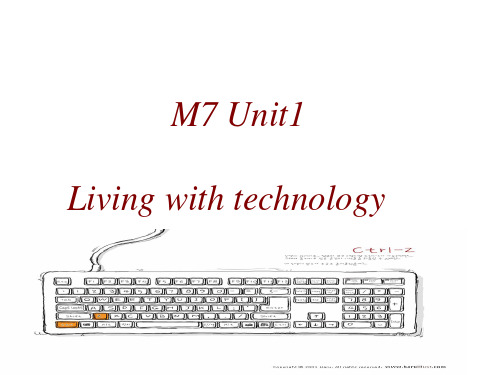
The development of electric devices:
colour TV
black-and-white TV
development of TV
LCD screen
desktop
Palm
development of computer
laptop
dictionary
development of dictionary
1.What can our human beings benefit from the development of electric and electronic appliances?
2.Can we depend on these appliances completely?
Summary
electronic dictionary
letter/telegram
telephone
development of
communication
beeper
cell phone
camera
digital camera
mobile phone with a camera
development of camera
washing machine TV (colour) air-condition mobile phone(with basic functions) mobile phone(with MP3 and camera)
What can you conclude from the timeline?
2.High technology has a direct effect on our life. What electric goods and electronic appliances(电器) do you have at home?
牛津高中英语模块七Unit1单词讲解

as opposed to(表对比) 而,相对于 This exercise develops skills as opposed to strength.
用delay的适当形式完成句子:
1. 我们决定把假期推迟到下个月。
delay (going on) our holiday We decided to ______________ until next month. 2. 我们必须马上离开。 We must leave ________________. without delay 3. 飞机起飞推迟了两个小时。 a delay of two hours before the There was _________ plane took off.
8. wind vt.&vi 上发条,缠绕,蜿蜒,曲折 wind up
上发条,摇动,转动,以. players had to be wound up by hand and only played records that were two minutes long.
4. delay
vt &vi (使)推迟,延迟 n. 延误,延迟
推迟做某事
立即,毫不延迟地
delay doing sth without delay
Generally speaking, big companies don’t delay paying their bills. My doctor advised me to give up smoking without delay.
牛津高中英语模块七Unit1备课要点
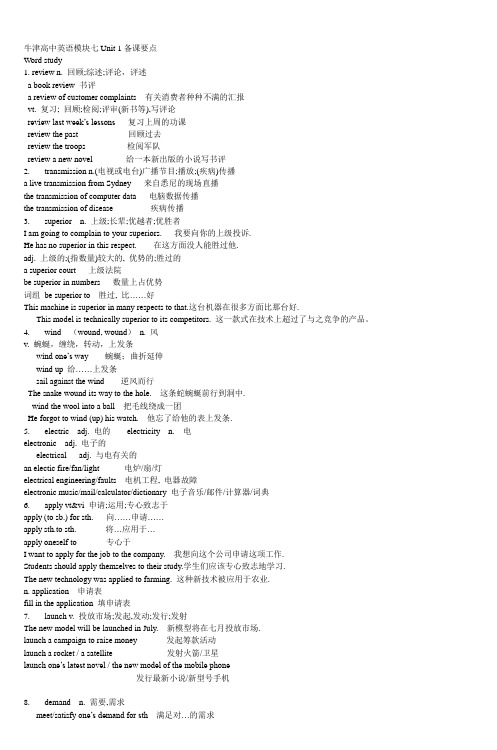
牛津高中英语模块七Unit 1备课要点Word study1. review n. 回顾;综述;评论,评述a book review 书评a review of customer complaints 有关消费者种种不满的汇报vt. 复习; 回顾;检阅;评审(新书等),写评论review last week’s lessons 复习上周的功课review the past 回顾过去review the troops 检阅军队review a new novel 给一本新出版的小说写书评2. transmission n.(电视或电台)广播节目;播放;(疾病)传播a live transmission from Sydney 来自悉尼的现场直播the transmission of computer data 电脑数据传播the transmission of disease 疾病传播3. superior n. 上级;长辈;优越者;优胜者I am going to complain to your superiors. 我要向你的上级投诉.He has no superior in this respect. 在这方面没人能胜过他.adj. 上级的;(指数量)较大的, 优势的;胜过的a superior court 上级法院be superior in numbers 数量上占优势词组be superior to 胜过, 比……好This machine is superior in many respects to that.这台机器在很多方面比那台好.This model is technically superior to its competitors. 这一款式在技术上超过了与之竞争的产品。
4. wind (wound, wound)n. 风v. 蜿蜒,缠绕,转动,上发条wind one’s way 蜿蜒;曲折延伸wind up 给……上发条sail against the wind 逆风而行The snake wound its way to the hole. 这条蛇蜿蜒前行到洞中.wind the wool into a ball 把毛线绕成一团He forgot to wind (up) his watch. 他忘了给他的表上发条.5. electric adj. 电的electricity n. 电electronic adj. 电子的electrical adj. 与电有关的an electic fire/fan/light 电炉/扇/灯electrical engineering/faults 电机工程, 电器故障electronic music/mail/calculator/dictionary 电子音乐/邮件/计算器/词典6. apply vt&vi 申请;运用;专心致志于apply (to sb.) for sth. 向……申请……apply sth.to sth. 将…应用于…apply oneself to 专心于I want to apply for the job to the company. 我想向这个公司申请这项工作.Students should apply themselves to their study.学生们应该专心致志地学习.The new technology was applied to farming. 这种新技术被应用于农业.n. application 申请表fill in the application 填申请表7. launch v. 投放市场;发起,发动;发行;发射The new model will be launched in July. 新模型将在七月投放市场.launch a campaign to raise money 发起筹款活动launch a rocket / a satellite 发射火箭/卫星launch one’s latest novel / the new model of the mobile phone发行最新小说/新型号手机8. demand n. 需要,需求meet/satisfy one’s demand for sth 满足对…的需求make demands on 对…提出要求v. 要求demand an apology from sb.要求某人道歉He demanded that the right to vote (should) be given to every adult woman.他要求选举权给予每一位成年女性.He demanded to meet the general manager. 他要求见总经理.9. degree n. 程度; 度; 学位to a certain degree/to some degree在某种程度上Water freezes at 0°C.(zero degrees centigrade) 水在0℃结冰.I agree with you to a certain degree. 在某种程度上我赞同你的观点.She received a doctor’s degree. 他获得了博士学位.10.spring n.春天;泉水;弹簧;弹性;发条The rubber has lost its spring. 橡皮没有弹性了.The spring of my watch is broken. 我手表的发条坏了.a mineral spring 矿泉水vi.(sprang-sprung) 跳跃;弹起spring up突然出现,涌现,迅猛发展The cat crouched ready to spring. 猫弓起背准备跳.Amusement parks for children are springing up all over the world. 孩子们的游乐场如雨后春笋般在全世界涌现出来.11.delight n. 高兴,喜悦.to one’s delight让某人高兴的是take delight in 以…为乐The naughty boy took delight in pulling the dog’s tail. 这个调皮的男孩喜欢拽狗尾巴.v. 使…高兴All things delight us. 事事都让我们高兴.adj. delighted delightingI’m delighted to receive your letter.12.convenience n. 方便,便利at one’s convenience 在某人方便的时候Can you telephone me at your convenience to arrange a meeting ?adj. convenientif it is convenient to sb. 如果你方便的话(注意:不可用人做主语.)13.assume vt. 假设,认为It is generally assumed that 。
牛津高中英语模块七Unit1单词讲解.ppt
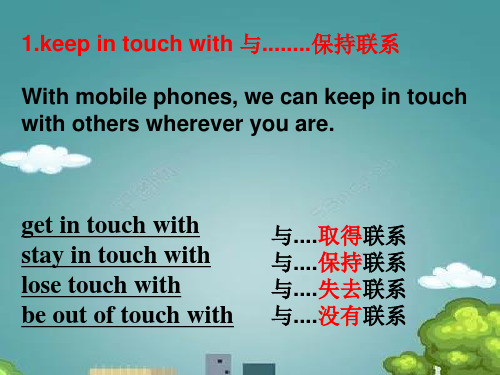
9. component n.
the components of a machine the car component industry Trust is a vital component in any relationship.
compose v Ten men composed the committee. Mozart composed his last opera shortly before he died.
1.keep in touch with 与........保持联系
With mobile phones, we can keep in touch with others wherever you are.
get in touch with stay in touch with lose touch with be out of touch with
They will distribute the books to the students in the flooded area.
distribution n. 分发,分配,分布
He was in charge of the distribution of food and medicine to the flood victims.
opponent 对手,竞争者
a political opponent
opposite adj . 相反的,对面的,对立的 n . 对立面,反义词 Prep. 在........的对面
He is considerate;his wife is just the opposite.
opposition n. in opposition to sth.
牛津高中英语模块七unit1单词讲解PPT课件
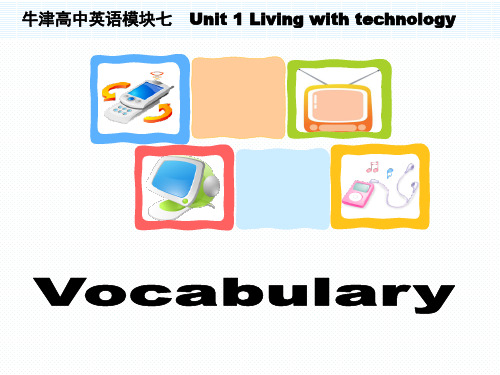
• avoid,miss,keep,practice,deny,finish,cease/ quit,appreciate/enjoy
• 禁止想象才冒险,不禁介意弃逃之 • forbid,imagine,risk,can’ t
help,mind,escape
牛津高中英语模块七unit1单词讲解PP T课件
of Mount Tai. • 狭窄的道路弯弯曲曲通往泰山山顶。
牛津高中英语模块七unit1单词讲解PP T课件
阅读下列句子,并理解: 牛津高中英语模块七unit1单词讲解PPT课件
11. Highway 99 winds its way along the coast.
12. In northern countries, a north wind is colder than a south wind.
4.accessible adj. 可使用的,可接触到的, 可到达的,易理解的
• They also make TV accessible to people who live far away from cities.... 它们也使远离城市的人们可以收看电视.....
• Medicine should not be kept where it is accessible to children.药品不应该放在儿 童容易拿到的地方。
牛津高中英语模块七unit1单词讲解PP T课件
• Let’s see if we can wind this up by 7 p.m. • 看看我们能不能在晚上7点前把这弄完。 • Jim wound a piece of string around the box
最新牛津高中英语模块七Unit1共71页PPT
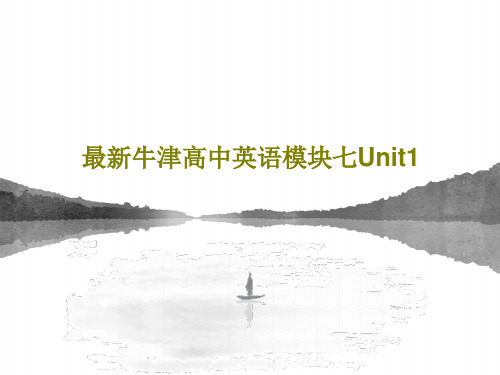
21、要知道对好事的称颂过于夸大,也会招来人们的反感轻蔑和嫉妒。——培根 22、业精于勤,荒于嬉;行成于思,毁于随。——韩愈
23、一切节省,归根到底都归结为时间的节省。——马克思 24、意志命运往往背道而驰,决心到最后会全部推倒。——莎士比亚
பைடு நூலகம்25、学习是劳动,是充满思想的劳动。——乌申斯基
谢谢!
最新牛津高中英语模块七Unit1
1、战鼓一响,法律无声。——英国 2、任何法律的根本;不,不成文法本 身就是 讲道理 ……法 律,也 ----即 明示道 理。— —爱·科 克
3、法律是最保险的头盔。——爱·科 克 4、一个国家如果纲纪不正,其国风一 定颓败 。—— 塞内加 5、法律不能使人人平等,但是在法律 面前人 人是平 等的。 ——波 洛克
牛津高中英语模块七unit1-Reading

development of
audio(音响) device
2021/3/11
20
walkman
MP4
2021/3/11
CD player
MD MP3
21
electric fan
fan
air conditioner
development of fan
2021/3/11
22
Discussion:
2021/3/11
24
Homework
1.Read two passages on P106-107
2.Preview reading. 3. Unit Revision: Period 1.
2021/3/11
25
M7 Unit1 Living with technology
Lead-in:
Science and 1.t_e_c_h_n_o_l_o_g_yplays an important role in exploring the unknown fields and realizing the dreams of our ancestors(祖先).
2021/3/11
12
electric fan
2021/3/11
hair dryer
13
Timeline
1982 1984 1985 1986 1990 1997 2001 2004
electric fan TV(black-and-white)
refrigerator development
washing machine TV (colour) air-condition mobile phone(with basic functions) mobile phone(with MP3 and camera)
- 1、下载文档前请自行甄别文档内容的完整性,平台不提供额外的编辑、内容补充、找答案等附加服务。
- 2、"仅部分预览"的文档,不可在线预览部分如存在完整性等问题,可反馈申请退款(可完整预览的文档不适用该条件!)。
- 3、如文档侵犯您的权益,请联系客服反馈,我们会尽快为您处理(人工客服工作时间:9:00-18:30)。
基础梳理·授之以渔
Ⅳ.教ie Baird constructed the first colour TV in 1928, but it was not until 1938 that the first colour TV programme was broadcast. (2009· 江西,27)It was that year A.when;then C.not until;that
本 课 栏 目 开 关
5.circumstance
E.to disagree with or disapprove of a plan or policy
答案 1.B 2.A 3.D 4.E
5.C
基础梳理·授之以渔
Unit 1
Ⅱ.短语与拓展 1. for good measure 额外
本 课 栏 目 开 关
基础梳理·授之以渔
B.将左栏的单词和右栏的英语释义连接起来 1.delay 2.wind 3. vote 4.oppose
Unit 1
A.to follow a course or path that curves or twists a lot B.a situation in which something happens later or more slowly than you expected C.the facts or conditions that affect a situation D.to formally express an opinion by choosing between two or more issues, people,etc.
本 课 栏 目 开 关
weighs 96 grams
(重 96 克 )and measures
104×72×15 mm. 9.In other words,the model with a camera costs twice as
much as (和„„的两倍一样多)the older model. 10.Who can foresee what the future will bring (将来会
Ⅲ.经典课文原句 1. John Logie Baird constructed the first colour TV in 1928, but
本 课 栏 目 开 关
it was not until 1938 that
(直到 1938 年)the first
colour TV programme was broadcast. 2. It took more than two decades (花了二十多年时间), though,until 1951,for regular colour TV broadcasts to begin in the USA. 3. Meanwhile, electrical components eventually became so
本 课 栏 目 开 关
book readers 6.This is where we have different kinds of eand electronic dictionaries (我们有不同种类的电子书
阅读器和电子词典的地方).
基础梳理·授之以渔
Unit 1
7.Vacuum cleaners are the best tool to keep carpets clean (保持地毯清洁的最佳工具). 8. It only
晨背佳句·日积月累
Unit 1
2.It is suggested/ordered/commanded that...should do... It is suggested that the meeting (should) be put off.有人 建议推迟会议。 3.It is impossible/necessary/strange that...should do/should have done... It is strange that he should have failed in this exam. 他竟然考试没及格,真够奇怪的。
本 课 栏 目 开 关
is of benefit to
the consumer.
answer for every error in the calculations.
how the accident happened.
5.Tell us in your own words
基础梳理·授之以渔
Unit 1
晨背佳句·日积月累
Unit 1
本 课 栏 目 开 关
Unit 1
句型公式
Living with technology
晨背佳句〃日积月累
1.It is+a pity/a shame that...should do/should have done... It is a pity that there should be so little charity abroad.在 国外竟然这么缺少仁爱,这是很可惜的。
本 课 栏 目 开 关
晨背佳句·日积月累
交际用语
Unit 1
1.from where I stand:according to what I know or feel 据我所知;在我看来 From where I stand , it seems like she’s being unreasonable. 在我看来,她好像是不讲道理。 2.make it:to be successful or able to go to an event 取得成功;能参加 I never thought Clare would make it as an actress. 我从来没想到克莱尔会成为一名成功的女演员。 We didn’t make it to the party in the end. 我们最终没能参加那个聚会。
基础梳理·授之以渔
Unit 1
本 课 栏 目 开 关
C 语境助记法 The drawback of the electronic device is obvious.Its battery can not be charged easily and the function of the receiver is sceptical.The storage of the machine is not ample.Many other components are not perfect in design.So we would reject this device.
本 课 栏 目 开 关
way 蜿蜒前进
基础梳理·授之以渔
Unit 1
5.insurance n.保险;保障措施→take out insurance 办 理保险 6.translation n.翻译;转化→translate ... into ...把„„翻 译成„„ 7.suitable adj.合适的,适当的→be suitable 合 8. vote vt. & vi.投票, 选举, 表决; n.选票; 选举, 表决→vote for 投票赞成→vote against 投票反对
基础梳理·授之以渔
Unit 1
5. in other words 换句话说 in one’s own words 用自己的话 6.make a list of 把„„列一个清单 7. in truth 说实话 to tell you the truth 老实说 8.face to face 面对面地 hand in hand 手拉手
基础梳理·授之以渔
Unit 1
学情自测 A.用括号中所给词的适当形式填空 1. Their goal was to make adult education more accessible (access). 2. Brazil has a very unequal income and wealth. 3.Try to read Baudelaire in the original and not in
small that ( 最 终 变 得 如 此 小 以 致 于 ) , by the late
1960s,portable cassette players were developed,...
基础梳理·授之以渔
Unit 1
4.There is something important about being together and sharing life that cannot be found over a telephone wire (这种东西是无法通过电话线获得的). 5. think watching too much TV (过多地看电视)just makes I you stupid.
本 课 栏 目 开 关
基础梳理·授之以渔
Unit 1
B
构词记忆法 v.进化
1.evolution n.演变,发展;进化→ evolve
本 课 栏 目 开 关
2.construct vt.制造;修筑,建造→ construction n.建筑 3. receiver n. 无线电接收机; 听筒, 受话器; 接受者→ receive v.收到 4.storage n.存储,储藏(空间)→ store → religion 拒绝 n.宗教 n. v.存储 5.religious adj.宗教的,宗教信仰的;笃信宗教的,虔诚的 6. reject vt.拒绝, 拒收; 不予考虑, 不予录用→ rejection
take measures 采取措施
2.benefit from 受益于„„ be beneficial to = be of benefit to 对„„有益 3.answer for 为„„负责 answer to 向„„交待 4.be of little importance 不重要 be of value 有价值的
